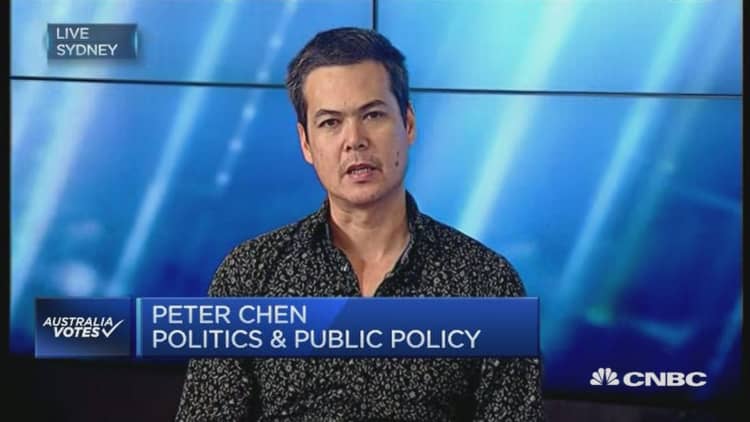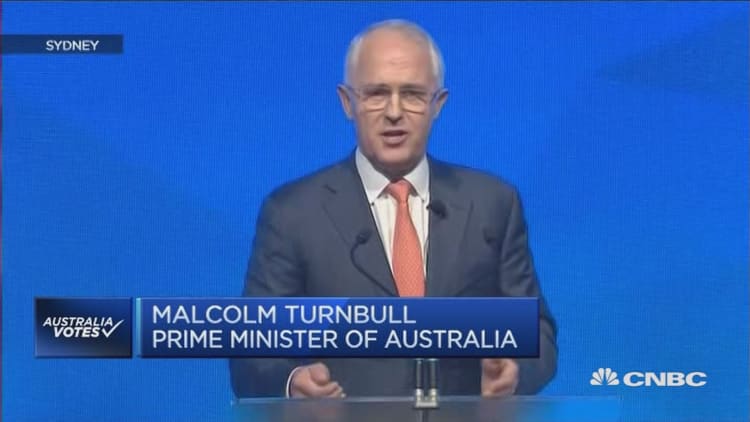It's been a marathon 8 week election campaign in Australia, and voters are finally heading to the polls on July 2.
Prime Minister Malcolm Turnbull is urging the Australian public to look for stability after five changes in the prime minister's chair in just over five years. Opposition Leader Bill Shorten, meanwhile, is hoping Australians aren't fatigued by a period of instability.
It's this history of instability that has voters lacking enthusiasm for the candidates, according to Mark Rolfe, Professor of the School of Social Sciences at the University of New South Wales.


"Neither leader has been able to galvanise voters with any sort of great oratory, [or] significant different policies that would easily gravitate voters their way", Rolfe told CNBC.
Rolfe said that continued changes in leadership of both the Liberal and Labor Parties, where the Prime Ministership has bounced from Kevin Rudd to Julia Gillard, to Rudd again, then to Tony Abbott and finally Malcolm Turnbull, have left voters dispirited.
Despite the disillusionment among voters, the Australian public and politicians have taken to social media, in the so-called "Facebook Election", showing a big shift in how the election campaign has played out.
Record social media engagement has created a battleground of tweets and tags that has facilitated discussion and debate in the 55 day campaign. According to Facebook, over 3.6 million people engaged in 30 million interactions on the platform
Turnbull Tops #ausvotes
Prime Minister Malcolm Turnbull and Opposition Leader Bill Shorten have used social media extensively during the campaign, and if the election result was based on followers alone, the Prime Minister would win in a landslide.
Across Facebook, Twitter and Instagram, Turnbull has a total of 985,513 followers, against Bill Shorten's 295,508. Turnbull has a long history of engaging on social media, and is famous for posting pictures riding public transport.
The incumbent Prime Minister is also ahead when it comes to the public's conversation. According to Twitter, of the number of tweets mentioning either leader, Turnbull was mentioned in 57 percent versus Shorten in 43 percent from June 21-27.
Turnbull has also generated the most engagement among political leaders on Facebook. Between May 7 and June 26, Malcolm Turnbull was discussed by 70 percent of people on Facebook in Australia, and Bill Shorten by 42 percent.
"I haven't seen this anywhere else in the world," said Rishi Jaitly, APAC vice president of media partnerships at Twitter.
"It's been a great election season and we're excited that we've been so central to the conversation,Twitter is the platform and microphone of choice, not just for candidates and parties or journalists, but for voters too," he told CNBC.
"The conversation is fun and humorous and I think it makes democracy more accessible for millennials," he said.
First Ever Facebook Debate
Despite Shorten's shortfall on social media, his Australian Labor Party leads the Liberals 66 percent to 51 percent when it comes to most discussed parties on Facebook.
In a reflection of the popularity of social media, the political leaders turned away from television cameras and debated the big issues in front of an online audience in the first ever Facebook Leaders Debate, broadcast live over the platform.
At its peak, the "Facebook Faceoff" on June 17 attracted an online audience of 12,400, but has since had 800,000 views. Leaders fielded questions on key topics including climate change, marriage equality and the economy.
Despite his smaller follow count, Opposition Leader Bill Shorten was credited with claiming victory in the discussion, which has been viewed over 800,000 times.
According to Facebook, it wasn't just the debate that was "live" this election campaign. A total of 62 politicians and parties used Facebook Live nearly 350 times over the course of the campaign.

